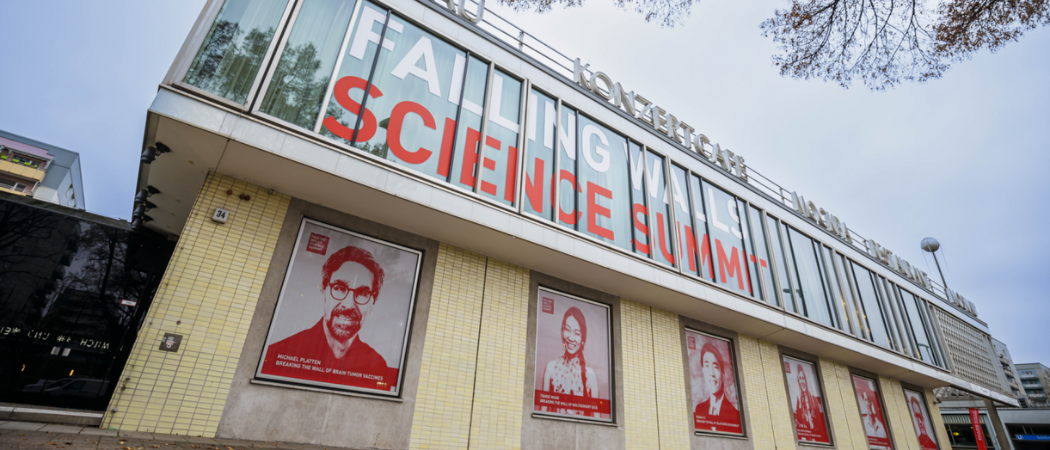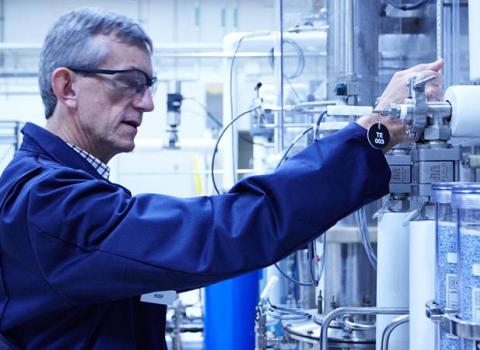At the annual Berlin summit, one question dominated: how can Europe translate research into innovation?

Photo credits: Falling Walls Foundation
Science|Business - Table.Media partnershipScience|Business has partnered with Table.Media, a leading source of news about higher education and research in Germany. Each week, we are publishing one of each other’s stories to give readers an even broader range of insight into R&D policy across Europe. |
Top in science, flop in innovation: rarely has the complaint about Europe's inability to make economic use of its cutting-edge research been voiced as unanimously and vehemently as at this year's Falling Walls science summit in Berlin.
The new German federal research minister Cem Özdemir joined the chorus when he made his first official appearance in front of an international audience on November 9.
“Europe is facing the existential challenge of closing the gap between research and innovation,” said Maria Leptin, president of the European Research Council (ERC), in a panel discussion the day before.
Leptin is not directly responsible for innovation, but she is in charge of the world's largest funding pot for basic research by selected scientists, which is filled with European taxpayers' money.
However, a recent open access study shows that US companies in particular benefit from the results of ERC-funded research projects. It concludes that the ERC is currently unable to overcome the European paradox – the continent’s much-vaunted transfer deficit.
The recently published report by former Italian prime minister Mario Draghi outlines just how much the future of the continent depends on this bridge building. Leptin referred to it when she warned at Falling Walls, “we are still lagging far behind America, but we should be leaders in innovation.”
She was supported by Patrick Hetzel, the new French research minister, whose first trip abroad in office took him to Falling Walls, which ran from 7-9 November.
Hetzel supports the idea of creating a European Fund for Research and Competitiveness which, in addition to promoting scientific excellence, provides for the transfer of results from conception to market maturity.
European Commission president Ursula von der Leyen is also determined to put science at the heart of the economy, reported Leptin, with a view to the upcoming negotiations for the EU Framework Programme 10, due to start in 2028.
Many different innovation policies
One important reason for the European translation deficit is the many different sets of rules and objectives, said Dutch science minister Robbert Dijkgraaf.
“We now have 27 innovation policies on the continent, plus the EU. We still think very nationally - we need a common strategy,” he said.
Even within Germany, there is a lack of integration, complained Michael Brigl from the Boston Consulting Group. “The 149 innovation clusters in the country lack a common direction.”
Rafael Laguna de la Vera, director of Sprind, Germany’s federal agency for breakthrough innovation, put the blame on a lack of capital.
“It costs around one billion euros to bring a product from research to the market - money that is not available in Europe,” he said.
And then there are the walls between the academic and industrial worlds: Marie-Noëlle Semeria, chief technology officer at Total Energies, called for them to be broken down.
‘Crazy stuff’
But how can all this succeed? There was a consensus at Falling Walls that a change in mindset was crucial. “We should cultivate a willingness to take risks,” recommended Hetzel, to combat the rampant despondency.
Anousheh Ansari, chief executive of the US-based XPrize Foundation, which offers innovation prizes, said that a dash of craziness is essential for deep tech innovations – that is, genuine technological breakthroughs. “Practical” improvements don’t win XPrize rewards, she stressed, but rather, “we want crazy stuff.”
Dietmar Harhoff, director at the Max Planck Institute for Innovation and Competition in Munich, said that a clear message from the top would be helpful
“Institute directors should propagate the idea of transfer and facilitate entrepreneur training,” he said. Instead of looking enviously at the US, Harhoff advises looking to role models from the same culture: “Sweden and the Benelux countries also have a flourishing start-up scene from which we can learn a lot.”
If Europe succeeds in transforming its scientific creativity into deep-tech innovations à la Google, Apple or Microsoft, a new report by the Boston Consulting Group predicts revenues in the trillions. This goal can only be achieved through massive upfront investment. In order to create unique start-ups, so-called unicorns, the industry needs tax breaks, reliable rules and the chance of direct funding along the lines of the US’s Inflation Reduction Act, said Semeria.
Laguna de la Vera recalled the billions of euros lying dormant in European pension funds. If used wisely, fewer start-ups would have to starve in the dreaded valley of death due to a lack of funding, said the Sprind boss. His demand: “let's tear down the walls between science funding and investment silos.”






 A unique international forum for public research organisations and companies to connect their external engagement with strategic interests around their R&D system.
A unique international forum for public research organisations and companies to connect their external engagement with strategic interests around their R&D system.